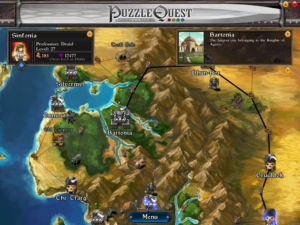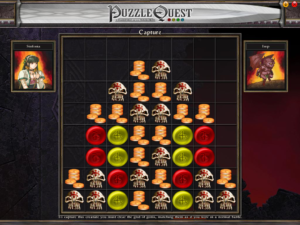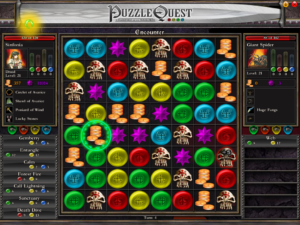Puzzle Quest: Investigations
Although it could probably get by on the novelty of its gameplay alone, Puzzle Quest actually does something a little interesting with the plot. The premise is uninspired — the peaceful cities suddenly come under attack by orcish slavers and undead, just like in about half the D&D campaigns ever devised. But rather than just go on an uninhibited slaughter spree into Mordor, the player character, recognizing that the orcs are taking captives at an unusually aggressive rate, goes and talks to them in their city in order to get more information. There are even quite a few side quests you can do on behalf of the “evil” races, such as killing various monsters for an ogre gourmand who’s gotta eat ’em all. Do enough of these quests and he joins your party to save time.
This isn’t to say that it’s Ultima VI-style “we’re all brothers under the skin/scales/chitinous plates” time here. Sometimes the enemy can’t be negotiated with, even if you try. One ogre chief, when asked “Is there really any need for war?”, memorably replies “Is there really any need for PEACE?” But overall, the monsters have been more helpful to me than my supposed allies, who have been stinting on aid even in the face of the return of ancient evils bent on taking over the world, preferring to sit back and watch me win the war singlehanded. They’re far enough from the real action to think it’ll never affect them. It’s the orcs and ogres and minotaurs who are already starting to live under the lash of something scarier than themselves and, in some cases, not liking it.
Diplomacy with monsters isn’t unheard of, of course, especially in RPGs. I think of Ultima Underworld, which has settlements of peaceful goblins and ghouls, or the peaceful resolution to the Triton quest in Quest for Glory V. But it’s unexpected here, where all the story is really required to provide is excuses for ever-escalating combat. Also, to get slightly political here, I’m slightly reminded of the immediate aftermath of 9/11. People are already forgetting this, but at the very beginning, there was actually some debate about whether the attacks should be treated as acts of war or as crimes. Terrorism, after all, usually falls under the purview of the police, and the clearest antecedent — the 1995 car bomb attack on the WTC — was handled by the NYPD and the FBI, not the armed forces. Now, in Puzzle Quest, you’re not dealing with terrorism, but unquestionable acts of military aggression by foreign powers. However, the PC largely treats it like a criminal investigation anyway, questioning witnesses in order to try to find the guy at the top, and cooperating with the local authorities when possible, even when the local authority is a dragon god or something. I’m not saying that the creators of Puzzle Quest have a political agenda here, but it’s a strange way to write a fantasy epic.
 Comments(0)
Comments(0)

